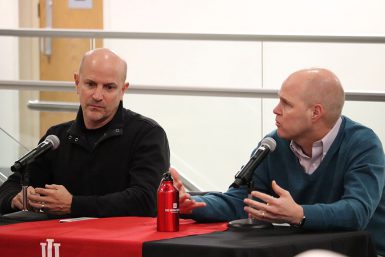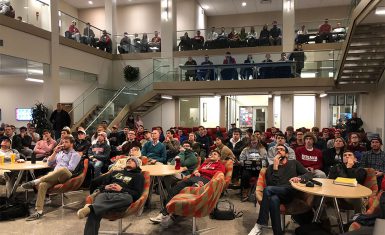Knight documentary director shares lessons on challenging powerful people
Robert Abbott stood in a riotous Dunn Meadow in September 2000 as crowds gathered to say goodbye to Bob Knight following his firing as IU men’s basketball coach. He did a 360, and saw helicopters and 15 satellite trucks all covering a story he had begun to crack years before.

“For about a minute or two, I just stood there and took it in,” Abbott said.
Abbott, a world sports journalist for CNN from 1987-2001, had been assigned in April 1999 to investigate why several McDonald’s All-American basketball players had left the Hoosier men’s basketball team during the span of a couple years.
That story led to an investigation and IU’s firing of Knight over problematic coaching incidents, resulting in an uproar across the state and nation.
Abbott joined a packed Franklin Hall commons to screen his documentary, The Last Days of Knight, on Monday. The 30 for 30 film, which premiered in April on ESPN+ only, airs at 7:30 p.m. Thursday on ESPN.
A Q&A with Abbott and his executive producer, John Dahl, followed the showing.
“We found out what can happen when a journalist goes after a powerful person and the structure in place to protect him,” Abbott said.
The 100-minute documentary details Knight’s rise to power, Abbott’s extensive reporting, and the investigation into assault accusations by player Neil Reed that would ultimately bring down Knight.
By detailing Knight’s path to three national championship titles and a gold medal, Abbott establishes how Knight became a “moral figurehead” of the state. Abbott explained this was critical for an audience to understand why it was so difficult to remove him and why his actions were defended.
As Abbott further investigated why those All-American players had left Knight’s team, he kept running into walls of silence. He compared it to trying to infiltrate a mafia family. But the more scared sources he spoke with, the more he couldn’t ignore the story.

“What were they afraid of?” Abbott said he asked himself.
His thorough investigation required on- and off-the-record sources speaking to him over the phone or in person over the course of several years. After first speaking with Reed after he had left IU, he spoke with him on the phone every week for a year.
“To do good journalism takes time,” he said.
Reed’s accusations were serious, so Abbott acquired seven or eight sources for every claim Reed or others made. He urged the students present to constantly question themselves in their reporting.
“I questioned myself every step of this process,” Abbott said. “I kept saying, ‘Is Neil Reed telling the truth?’ … If you keep questioning yourself and the answer keeps coming up the same, you can have a little more confidence.”
It was important to Abbott and Dahl to humanize Reed, as fans of Knight attacked him harshly after his allegations were made public. Abbott said it is not uncommon for the public and its institutions to dismiss a powerless person when he or she tries to make a claim against someone in power.
“I hope after watching the film, people stop and think, ‘Hey, what does this person have to gain?’” he said. “I start putting myself in their spot, saying, ‘They have a lot to lose here and not a lot to gain.’ To me, that gives a little more credibility to them.”
Abbott encouraged the journalists in the room to treat others in their reporting the way they would want to be treated. Keep the humanity in the forefront of the reporting and storytelling, he said, because those stories are the ones that matter.
Abbott closes the film by focusing on Reed’s life following the infamous tape of him being choked by Knight going public. Reed’s career as a school basketball coach and a father of two girls was cut short when he died suddenly in 2012. This made a more detailed look at a man affected by abused power even more important to Abbott.
“Tell the human story in front of you,” he said.
Abbott and Dahl said they hope the film reminds people why it is important to hold people in power accountable and to recognize the power of good journalism.

